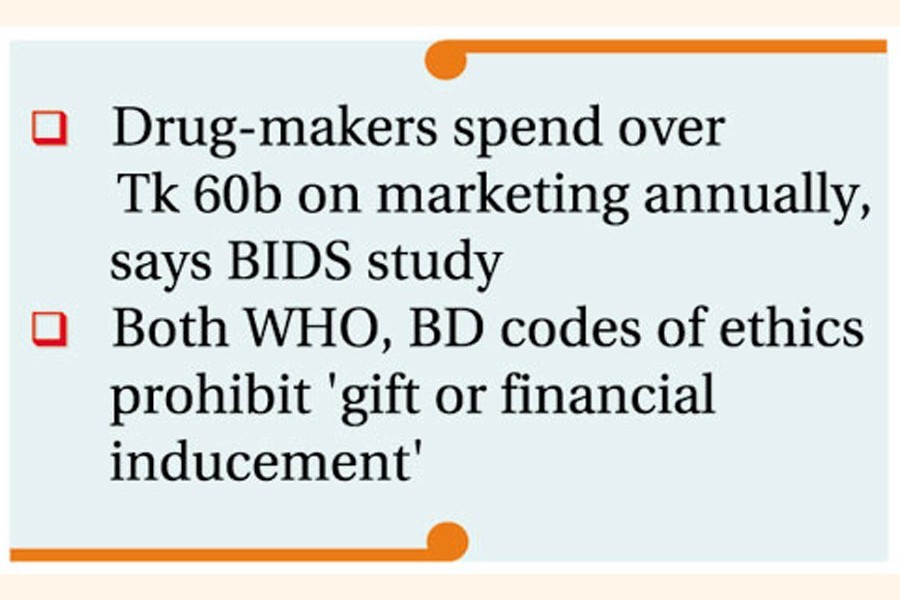Promotional gifts of the pharmaceutical companies to doctors, chemists, druggists and others along the trade line will no more be entitled to tax benefit, worth billions.
The VAT authority under the National Board of Revenue (NBR) rejected a plea of the pharmaceutical industries to allow VAT rebate on such promotional items to continue.
Officials argue those are not raw materials (inputs) but pharmaceutical companies have obtained billions of taka in VAT rebate on the items for years. And the largesse includes even vehicles and many luxury items, they say.
The VAT (value-added tax) wing, responding to a letter from the Bangladesh Association of Pharmaceutical Industries (BAPI), cleared its latest position on VAT waiver.
The matter came into focus after the Large Taxpayers Unit (LTU) recently disallowed VAT-rebate claim of the pharmaceuticals on the promotional items.
LTU-VAT commissioner Wahida Rahman Chowdhury said the LTU sought NBR's directive to settle the issue and the board gave its decision accordingly.
"As per law, such promotional activity is not entitled to enjoy the VAT rebate," she adds.
According to the current drug policy, the pharmaceutical industries are not allowed to give advertisement on medicines without prior permission of the drug administration, she notes.
In its letter to the NBR, the BAPI urged the tax authority to incorporate into policy such 'promotional activity' offering tax-rebate facility to make drugs familiar to doctors.
The names of the pharmaceutical companies, logos, the names of drugs, prescriptions containing details, pads, literatures, show card, banner, pen and other gift products could be incorporated into the VAT and Supplementary Duty Act 2012 through amendments to offer the benefit, they demanded.
BAPI proposed amendments of section 2(18 Ka) and section 46 of the law to this effect.
Secretary-General of the association SM Shafiuzzaman made the request recently in a letter to the revenue board.
Pharmaceutical industries have long been distributing such promotional items which they claim as 'service' similar to suppliers, construction companies, furniture suppliers, WASA, auction-product purchaser, credit-card issuer, readymade garments marketing etc.
Printed promotional material, promotional items containing logos of pharmaceutical companies, capital-machinery type of products should enjoy the VAT-rebate facility, they further said.
The BAPI claimed that VAT at source on production and business stages is 17.4 per cent on pharmaceuticals.
The pharmaceutical sector contributes 6.0 per cent of the total internal revenue.
Offering gifts to doctors has been a controversial issue for long. Insiders in some pharmaceutical companies say they are also not in favour of such "unethical practice of bribing" the doctors, chemists with luxury products, but sample medicine, pad, literatures and other products could be allowed for VAT rebate as promotional items.
BAPI treasurer Md Halimuzzaman says it's an international marketing practice to popularize drugs and make it familiar to the doctors.
"We have code of pharmaceuticals marketing practice to maintain compliance," he adds.
He says spirit of the new VAT law is to offer rebate but now each of the pharmaceutical companies is getting letters from field office with VAT demand on promotional items.
He, however, assures of accepting NBR's decision on this impugned matter.
A Bangladesh Institute of Development Studies (BIDS) study reveals that pharmaceutical companies in Bangladesh spend more than Tk 60 billion on marketing per annum.
It also shows pharmaceutical companies spent 29.6 per cent of their turnover on marketing in 2018, while the drug market was worth Tk 205.11 billion that year.
A major amount of this marketing expenditure is spent to give gifts to doctors.
Another study, conducted by BRAC in 2015, showed approaches such as inducements, persuasion, emotional blackmail, serving family members of the doctors and others are used by the pharmaceutical companies to influence popular physicians to establish brand loyalty.
Such marketing strategy goes completely against the code of marketing practices, it notes.
According to Article 19 of the Ethical Criteria for Medicinal Drug Promotion of the World Health Organisation (WHO), 'Medical representatives should not offer inducements to prescribers and dispensers. Prescribers and dispensers should not solicit such inducements'.
The Code of Pharmaceutical Marketing Practices in the country mentions that 'no gift or financial inducement shall be offered or given to members of the medical profession for purposes of sales promotion'.


